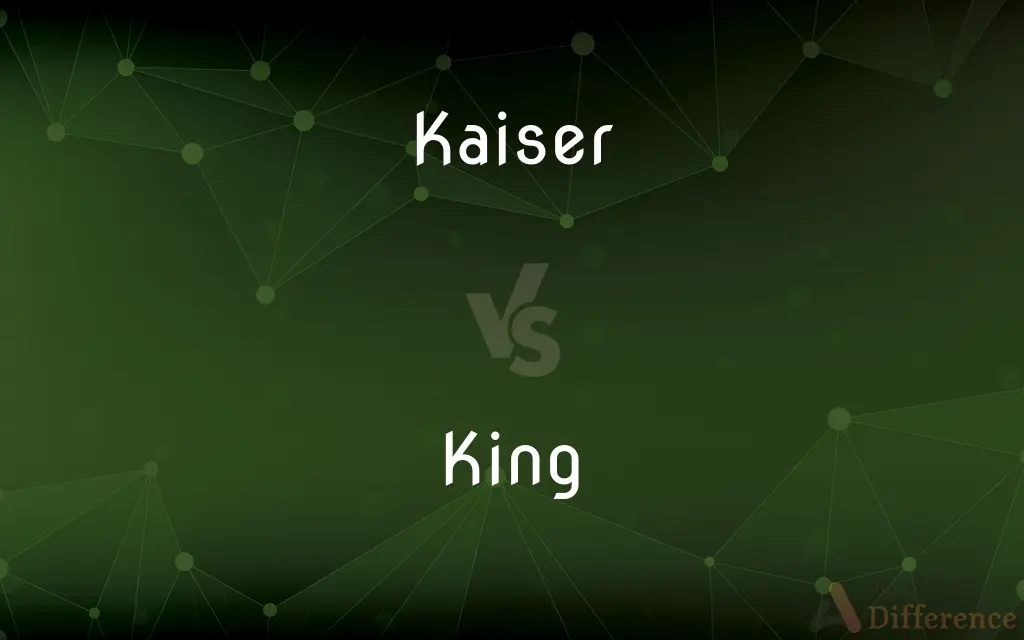Kaiser vs. King — What's the Difference?
Edited by Tayyaba Rehman — By Fiza Rafique — Updated on May 2, 2024
Kaiser refers to an emperor in German history, particularly in the context of the German Empire; king is a general term for a male monarch or head of state.

Difference Between Kaiser and King
Table of Contents
ADVERTISEMENT
Key Differences
Kaiser is a specific title used historically in Germany to denote an emperor, derived from the Roman title Caesar. Whereas, king is a universal title for a male sovereign or monarch, used across various cultures and nations.
Kaisers ruled large empires and were often seen as having higher authority than kings, being equated with emperors. On the other hand, a king typically rules a single country or kingdom and might not hold the imperial status that a kaiser possesses.
The role of a kaiser was particularly prominent in the German Empire from 1871 until the end of World War I, when the monarchy was abolished in 1918. Conversely, kings have been and continue to be integral parts of monarchies around the world throughout history and into the present.
While kaiser is a title that was specifically used in the German and Austrian contexts, king is a more generic term and is not limited to any particular region or culture, making it a more universally recognized monarchical title.
Both titles imply a hereditary or dynastic rule, typically involving a ceremonial and political leadership role, though the extent and nature of their powers can vary significantly based on historical and national contexts.
ADVERTISEMENT
Comparison Chart
Title Origin
German, from Latin ‘Caesar’.
English, from Old English ‘cyning’.
Authority
Equivalent to an emperor.
Sovereign ruler of a kingdom.
Cultural Usage
Specific to German-speaking areas.
Universal across various cultures.
Historical Period
Predominantly 1871-1918 in Germany.
Ancient to modern times worldwide.
Political Power
Often held supreme command in empire.
Varies widely, sometimes purely ceremonial.
Compare with Definitions
Kaiser
Hereditary title.
The role of Kaiser was passed down through the Hohenzollern family.
King
Dynastic head.
The king is the head of the royal family.
Kaiser
Derived from Caesar.
The title ‘Kaiser’ is directly derived from Julius Caesar’s name.
King
Ruler of a kingdom.
The king decreed a new law for the land.
Kaiser
Title in Germany.
The last Kaiser abdicated in 1918.
King
Male monarch.
King Henry VIII is famous for his six marriages.
Kaiser
German emperor.
Kaiser Wilhelm led Germany during World War I.
King
Hereditary position.
The throne is passed to the oldest son of the king.
Kaiser
Associated with empire.
The Kaiser ruled over the German Empire.
King
Symbolic leader.
In modern contexts, the king often serves a ceremonial role.
Kaiser
Kaiser is the German word for "emperor" (female Kaiserin). In general, the German title was only used for rulers above the rank of king (König).
King
King is the title given to a male monarch in a variety of contexts. The female equivalent is queen, which title is also given to the consort of a king.
Kaiser
Any of the emperors of the Holy Roman Empire (962-1806), of Austria (1804-1918), or of Germany (1871-1918).
King
A male sovereign.
Kaiser
Used as the title for such a man.
King
One that is supreme or preeminent in a particular group, category, or sphere
"In many countries, soccer is the king of sports" (Cameron W. Barr).
Kaiser
Alternative form of Kaiser.
King
A man chosen as the winner of a contest or the honorary head of an event
A homecoming king.
Kaiser
The ancient title of emperors of Germany assumed by King William of Prussia when crowned sovereign of the new German empire in 1871.
King
Abbr. K A playing card bearing the figure of a king, ranking above a queen.
Kaiser
The title of the Holy Roman Emperors or the emperors of Austria or of Germany until 1918
King
Abbr. K The principal chess piece, which can move one square in any direction and must be protected against checkmate.
King
A piece in checkers that has been moved to the last row on the opponent's side of the board and been crowned, thus becoming free to move both forward and backward.
King
Kings(used with a sing. verb) See Table at Bible.
King
A king-size bed.
King
Principal or chief, as in size or importance.
King
Of or relating to a king-size bed
King sheets.
A king bed skirt.
King
To make (a piece in checkers) into a king; crown.
King
A male monarch; a man who heads a monarchy. If it is an absolute monarchy, then he is the supreme ruler of his nation.
Henry VIII was the king of England from 1509 to 1547.
King
A powerful or majorly influential person.
Howard Stern styled himself as the "king of all media".
King
Something that has a preeminent position.
In times of financial panic, cash is king.
King
A component of certain games.
King
(chess) The principal chess piece, that players seek to threaten with unavoidable capture to result in a victory by checkmate. It is often the tallest piece, with a symbolic crown with a cross at the top.
King
(card games) A playing card with the letter "K" and the image of a king on it, the thirteenth card in a given suit.
King
A checker (a piece of checkers/draughts) that reached the farthest row forward, thus becoming crowned (either by turning it upside-down, or by stacking another checker on it) and gaining more freedom of movement.
King
The central pin or skittle in bowling games.
King
A king skin.
Oi mate, have you got kings?
King
A male dragonfly; a drake.
King
A king-sized bed.
King
(graph theory) A vertex in a directed graph which can reach every other vertex via a path with a length of at most 2.
King
To crown king, to make (a person) king.
King
To rule over as king.
King
To perform the duties of a king.
King
To assume or pretend preeminence (over); to lord it over.
King
To promote a piece of draughts/checkers that has traversed the board to the opposite side, that piece subsequently being permitted to move backwards as well as forwards.
King
To dress and perform as a drag king.
King
A Chinese musical instrument, consisting of resonant stones or metal plates, arranged according to their tones in a frame of wood, and struck with a hammer.
King
A chief ruler; a sovereign; one invested with supreme authority over a nation, country, or tribe, usually by hereditary succession; a monarch; a prince.
Kings will be tyrants from policy, when subjects are rebels from principle.
There was a State without king or nobles.
But yonder comes the powerful King of Day,Rejoicing in the east
King
One who, or that which, holds a supreme position or rank; a chief among competitors; as, a railroad king; a money king; the king of the lobby; the king of beasts.
King
A playing card having the picture of a king{1}; as, the king of diamonds.
King
The chief piece in the game of chess.
King
A crowned man in the game of draughts.
King
The title of two historical books in the Old Testament.
King
To supply with a king; to make a king of; to raise to royalty.
Those traitorous captains of Israel who kinged themselves by slaying their masters and reigning in their stead.
King
A male sovereign; ruler of a kingdom
King
A competitor who holds a preeminent position
King
A very wealthy or powerful businessman;
An oil baron
King
Preeminence in a particular category or group or field;
The lion is the king of beasts
King
United States woman tennis player (born in 1943)
King
United States guitar player and singer of the blues (born in 1925)
King
United States charismatic civil rights leader and Baptist minister who campaigned against the segregation of Blacks (1929-1968)
King
A checker that has been moved to the opponent's first row where it is promoted to a piece that is free to move either forward or backward
King
One of the four playing cards in a deck bearing the picture of a king
King
(chess) the weakest but the most important piece
Common Curiosities
Are there any countries currently using the title Kaiser?
No, the title Kaiser is no longer in use since the abolition of the German monarchy in 1918.
How does the leadership style of a Kaiser compare to that of a King?
Leadership styles varied, but Kaisers often wielded more direct political and military power, reflecting their imperial status.
What is the historical significance of a Kaiser in Europe?
The Kaisers were pivotal in European politics, particularly during the unification and expansion of Germany.
How did the public view Kaisers compared to Kings?
This varied by period and region, but Kaisers were often viewed with a mix of awe and controversy, especially in wartime.
Was the title of Kaiser hereditary?
Yes, like kings, Kaisers typically inherited their position through dynastic succession.
What is the main difference between a Kaiser and a King?
A Kaiser is a German emperor, whereas a King is a universal term for a male monarch.
What responsibilities did Kaisers and Kings have?
Both had ceremonial duties and political influence, though the extent depended on the constitutional framework of their countries.
Can a King have as much power as a Kaiser?
It depends on the specific historical and national context, but typically a Kaiser had broader imperial authority.
Is there a female equivalent to Kaiser and King?
Yes, ‘Kaiserin’ and ‘Queen’ are the female equivalents, respectively.
Which title is higher, Kaiser or King?
Kaiser is typically considered higher as it is equivalent to an emperor.
Share Your Discovery

Previous Comparison
Cadence vs. Tone
Next Comparison
Pennant vs. FlagAuthor Spotlight
Written by
Fiza RafiqueFiza Rafique is a skilled content writer at AskDifference.com, where she meticulously refines and enhances written pieces. Drawing from her vast editorial expertise, Fiza ensures clarity, accuracy, and precision in every article. Passionate about language, she continually seeks to elevate the quality of content for readers worldwide.
Edited by
Tayyaba RehmanTayyaba Rehman is a distinguished writer, currently serving as a primary contributor to askdifference.com. As a researcher in semantics and etymology, Tayyaba's passion for the complexity of languages and their distinctions has found a perfect home on the platform. Tayyaba delves into the intricacies of language, distinguishing between commonly confused words and phrases, thereby providing clarity for readers worldwide.
















































